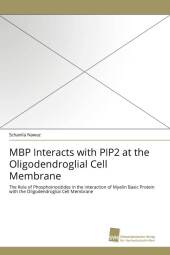 Neuerscheinungen 2011Stand: 2020-01-07 |
Schnellsuche
ISBN/Stichwort/Autor
|
Herderstraße 10
10625 Berlin
Tel.: 030 315 714 16
Fax 030 315 714 14
info@buchspektrum.de |

Schanila Nawaz
MBP Interacts with PIP2 at the Oligodendroglial Cell Membrane
The Role of Phosphoinositides in the Interaction of Myelin Basic Protein with the Oligodendroglial Cell Membrane
2011. 104 S. 220 mm
Verlag/Jahr: SÜDWESTDEUTSCHER VERLAG FÜR HOCHSCHULSCHRIFTEN 2011
ISBN: 3-8381-2079-5 (3838120795)
Neue ISBN: 978-3-8381-2079-9 (9783838120799)
Preis und Lieferzeit: Bitte klicken
The only protein known to be essential for myelin formation and compaction in the central nervous system is myelin basic protein (MBP). The association of MBP as a positively-charged protein with negatively charged membranes is crucial for myelination, but the mechanisms by which MBP associates with the myelin membrane remains elusive. Here I demonstrate that the signaling lipid PIP2 is important for the stable association of MBP with cellular membranes. This association is lost upon specific decrease of membrane charges through selective hydrolyzation of PIP2 levels or through elevated intracellular Ca2+ levels. Further experiments implicate that one putative PIP2 binding domain of MBP lies within the exon-1 encoded region. The relevance of this protein-lipid interaction was demonstrated for the corpus callosum of mice, after decreasing membrane surface charges in acute brain slices. Here, PIP2 hydrolysis led to the loss of myelin compaction. The results demonstrate that PIP2 plays an important role in MBP association to the plasma membrane. These findings provide a novel link between phosphoinositol metabolism and MBP function in oligodendrocytes in development and disease.
Schanila Nawaz completed her PhD in the field of Neuroscience inJanuary 2009 at the Max Planck Institute for ExperimentalMedicine in Göttingen, which was followed by a short postdocperiod, in the Biophysics department of the University ofGöttingen. She has an undergraduate training in biotechnologyfrom the University of Stuttgart.


